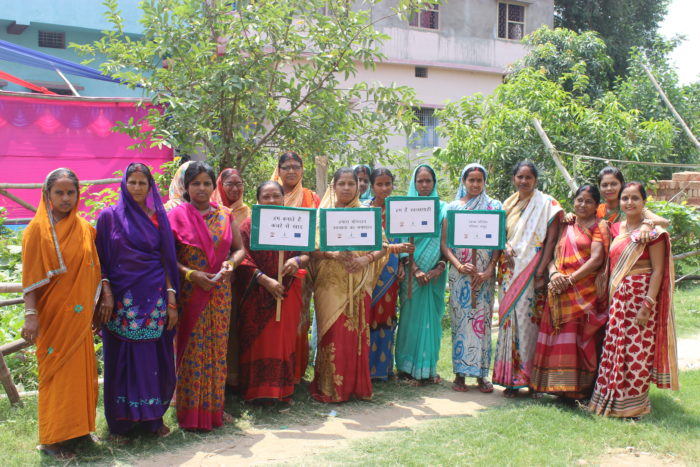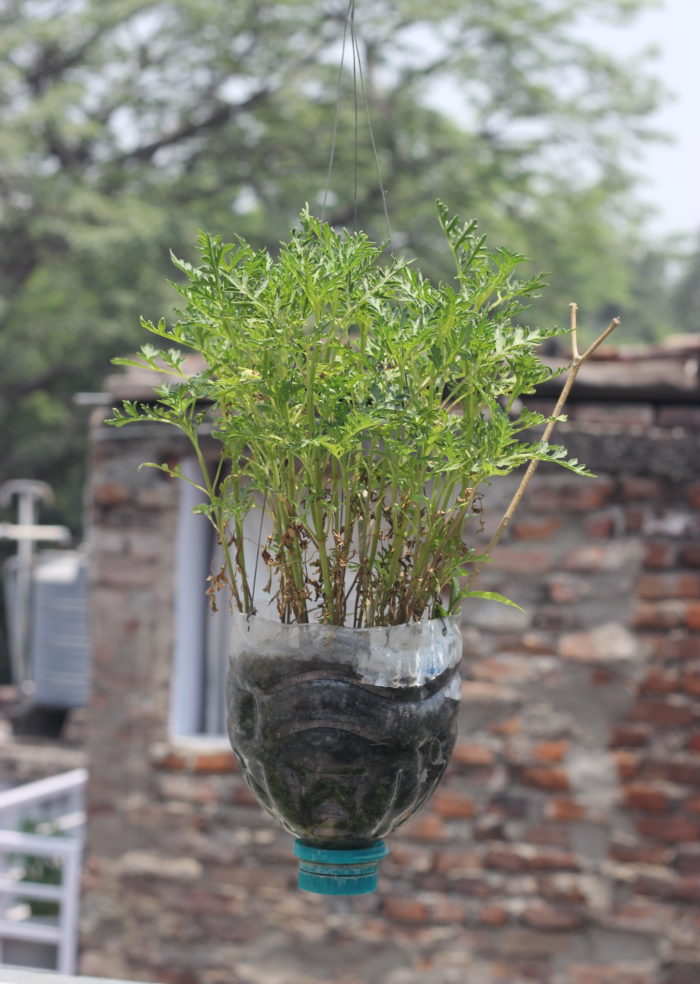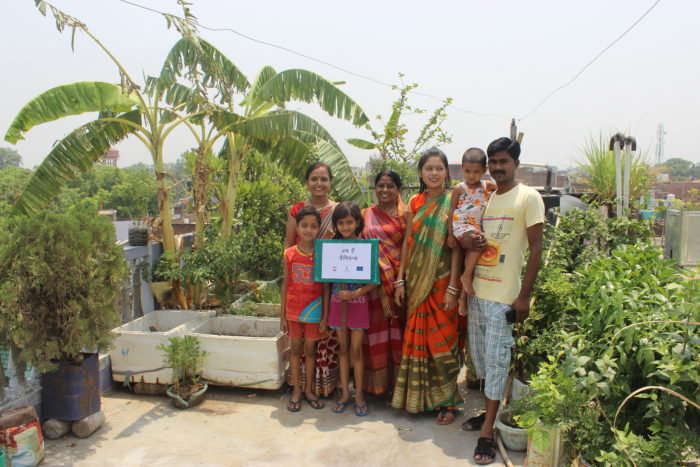Khushi Kumari first learned about composting through a book that belonged to her daughter. But she never thought it would be a practice that she would take up. With technical support from the Aga Khan Foundation, Khushi now not only produces compost right from her terrace garden but she’s gained a new title: the “Community Cleanliness Champion.” She hopes this will motivate her neighbors to practice efficient waste management at home.
Khushi, a 29-year-old arts graduate and mother of two who lives in Khagaul, Bihar, India, has always been bothered by the piles of waste near her home and around her neighborhood. The practice of dumping waste in open spaces is often caused by inefficient and irregular waste collection services.
For a long time, Khushi and her neighbors had no choice but to dump their household waste right outside their home. This created a health hazard for the community.

New Model for Waste Reduction
With support from the European Union and the Bihar government, the Aga Khan Foundation is developing a sustainable and environmentally viable model for solid waste management. The program works in urban and peri-urban areas to improve the capacity of urban government agencies for effective solid waste management. It also increases citizen participation in efficient waste management practices. The program has focused on mobilizing the community to separate waste and compost at the household level.
As a result of new practices that Khushi and her family now follow inside their home, it’s a different picture outside the home. Khushi says, “Before, my family had no option but to dispose our household waste near our house in the open and wait for the waste collectors’ vehicle to come. Sometimes the collector wouldn’t show up for days.” So the waste piled up and the foul smell grew unbearable. “Now that we have learnt how to compost, we are proud we are contributing to a cleaner and greener neighborhood.”

It all started when Khushi and her mother-in-law received an unexpected visit from the AKF team. As part of the program, AKF team members were conducting a door-to-door awareness of the different types of waste, separation, and the composting process. The team caught the interest of Khushi’s mother-in-law, an avid gardener.
Khushi and her mother-in-law spent an afternoon with the team, learning about how they could efficiently manage waste at home, create compost for their garden, and help reduce the waste dumped outside their house. What captured their attention was the simplicity and cost-effectiveness of composting.
Composting for a Win-Win
After the session, that very same day, Khushi started separating wet kitchen waste from dry plastic waste. She discarded the wet waste into an old bin she found lying around the house. Over the following 45 days, with regular visits and support from the AKF team, she transformed the waste into compost using only dry leaves and soil. Her family has repeated the composting cycle seven times already, producing over 20 kilograms of organic compost for growing more produce for her family.
Khushi uses the compost to grow organic vegetables in her terrace garden, which recently received a lush makeover. Her household now produces so much compost that Khushi plans to sell the surplus. She says her family is careful about reducing their plastic consumption as well. Wherever possible, they re-use plastic containers to create planters for the garden.

Khushi Becomes a Community Champion
Composting has made Khushi a Cleanliness Champion in her community. She regularly visits households in her neighborhood to spread awareness about the health problems caused by open dumping. And she encourages others to compost right from their homes. Many families nearby have started composting and are reaping the benefits of a cleaner and greener neighborhood, she says.
Asked about the effect in her community, Khushi replies, “A positive impact can be seen across the neighborhood. Now, families are making compost with their kitchen waste instead of throwing it outside. Our passages are clean and we can feel safe with our children playing outside.”
The Big Picture
Since the program started in 2017, more than 350 households in Khushi’s ward have initiated composting and they have seen a 60% decrease in the amount of waste discarded in open dumping grounds there.
Furthermore, households see monthly savings of INR 45 (USD $0.63) as families buy less fertilizer and manure, using instead their household compost. While that may not sound like much, it’s enough to buy necessities like detergent for a month, or a week’s supply of rice for a family of five.
Khushi hopes that more households will adopt home composting and remains keen to share her knowledge with others. The knowledge-sharing and advocacy efforts of Community Cleanliness Champions like her are playing a vital role in spreading a community-led model for healthier living.
Prepared by the Aga Khan Foundation India team. Click here to see more about Aga Khan Foundation’s work with community-led sanitation initiatives in India.